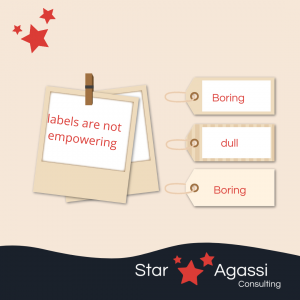Labels!
Labels, labels, labels. Labels help us in the store to purchase wisely, we label certain positive characteristics about ourselves and others. On the negative side, labels can create stereotypes, biases, stigmas and unfair judgments. I have to confess yes I have been on the labelling road. When society uses labels is has a devastating lasting impact. Labels can be from lack of knowledge, prejudice resulting in discrimination against the person or persons being labelled.
Labels are not effective. From the article in Forbes magazine by Bryan Kramer (who is the Proud Father of H2H, Business Performance Coach)
Why It’s Time To Stop Labeling Ourselves And Those Around Us
We label others all the time. It helps us to compartmentalize situations and behaviors. Often, we’re actually communicating something about ourselves by saying, “I’m not that.”
However, the fact that we label people by their behavior and characteristics can end up limiting our curiosity about a person. Our interest can end in exploring a connection with someone because we think we know who they are and that it might not align with our value system.
Imagine others doing this to you, constantly. It feels unfair, doesn’t it? But, we also do this to ourselves, willingly. And above all, we should be the ones who understand that context, nuance and a complex hive of emotions and past experiences are behind every label.
Labels take on an “all-or-nothing” meaning. Someone either is something, or they’re not; it’s our brain making irrational shortcuts.
Think back to your high school days. The first moment everyone walks into school, they’re judged, labeled and put in a box. It’s very difficult to change, and most people have that label till the day they leave. School isn’t the world, but it’s difficult to prove that to a teenager. Imagine if everyone had kept those labels … jeez.
Based on my work experience with the RCMP, labelled all RCMP as bad. No, obviously that is really an unfair judgement/label of course because we know there are a few ‘bad’ behaving officers, but most are good people working in a dysfunctional system in need of a cultural shift. So labels, we all do it at some point in our life we label people. We put them in a box and label them. We label people either consciously or subconsciously and it’s a dangerous, unfair thing to do for any situation and in relationships. One event/event/experience/mistake does not define the person.
For example, be honest when you see someone in the street and they don’t have the newest fashion, their hair might be scraggly, they might have dirt on their boots, what’s your first thought? Is this person homeless or is this person coming from work in construction? What are your first thoughts at the stop sign with a squiggly person? Be curious.
When we shift from labelling to one of curiosity it’s amazing the interesting stories and people we will experience.
Here’s another example of how I learned to be aware of labels and what happens when we put people into a box with a label.

A few years ago I was attending college to finish up on my second diploma in business management. In this particular class the instructor of a three-hour lecture, spoke in a monotone voice, no vocal variety, lots of “uhms”, no smiles at the students. He would randomly break out into laughter while the class remained silent completely unaware that he had made a joke. It was a tough class to be in and try to stay awake. My mind would wander and end up missing some of the lectures. Living with PTSD already had affected the ability to concentrate so this class was really going to be a challenge. After the third week, I struggled to stay awake and pay attention. The night before fourth class I was complaining to my sister about how boring the teacher was and the struggles. She said something to me that change the way I look at people forever.
Listening intently to her words, “You know Sherry, maybe he talks like that because somethings happening in his life that you don’t know about. Maybe his wife is sick, maybe his kids have addiction issues maybe he was diagnosed with an illness, maybe he’s losing his job?”
Like a lightning bolt of awareness!
I never thought of that? You see I put him in that boring box with labels all over it that said dull, dull, dull, boring, boring, boring.
The very next day at class, I sat in the same spot in the classroom with the rest of the students. He gave the same type of lecture, he spoke the same way nothing changed. However, I listened through a different lens. I listened through a compassionate lens, a lens of curiosity and not one of labelling. To my amazement and surprise, found this professor to be incredibly brilliant, with a hilarious sense of humour. It was a wonderful learning experience for the remainder of the classes and I enjoyed every lecture.
You see he didn’t change, I did. I changed in how I listened without labelling, without judging.
It truly is amazing when we are aware of how we either consciously, or subconsciously use labels instead of being curious and looking at everyone and every experience through a lens of curiosity, and compassion.
If there’s anything I’ve learned over my lifetime it is to be curious about ourselves, be willing to grow and find better ways in how we communicate but also and how we understand others in all of our relationships. It truly is a gift when we look at others with lens compassion and curiosity.
We have an opportunity to live without labels if we are willing to be aware of them in the first place. Awareness is the first step to changing how we look, listen and interact with those around us in our daily lives.
